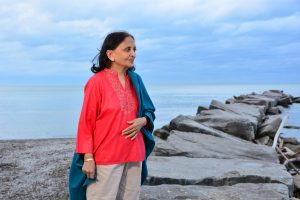Hasu Patel (2016-2017)
 HASU PATEL, composer, performer and educator, is one of the few world-class female artists performing today Classica Music of India on sitar, the most popular string instrument of India. Hasu plays Sitar in a style known as Gayaki Ang (vocal style), where the sitar replicates the fluidity and subtle nuances of the human voice. This innovative
HASU PATEL, composer, performer and educator, is one of the few world-class female artists performing today Classica Music of India on sitar, the most popular string instrument of India. Hasu plays Sitar in a style known as Gayaki Ang (vocal style), where the sitar replicates the fluidity and subtle nuances of the human voice. This innovative
technique, which is credited to her Guru, the Sitar legend Ustad Vilayat Khan Sahib of Imdad Khani Gharana, is the most significant contribution to her music inheritance. Called a “brilliant musician,” a “ceaseless champion o
f India’s music,” and a sitarist whose “performance is memorizing,” Patel has dedicated her life to preserving and propagating in its pristine purity, the fascinating, and highly evolved classical music of Ancient India.
Born in the culturally rich city of Baroda, India, Hasu began her musical studies in early childhood. At the age of 10, she made her first public appearance. She had many years of rigorous training under her illustrious Gurus Prof. N.B. Kikani and Ustad Anwar Khan Sahib. She is the first woman to receive a music degree with a Gold medal in the 75-year history of the Faculty of Performing Arts, M.S. University, Baroda, India. At the age of 21, she won the first prize in Gujarat State for the stringed instrument competition held by All India Radio.
Patel has performed professionally for decades in the United States, Canada, India, and China. Her performance of Raga Sangeet (scientific, precise, subtle and aesthetic system of melodic notes accompanied with tremendous vitality on Tabla) is in wide demand at conservatories and universities throughout the United States as well as national world/jazz/country music festivals, performing art centers, music and sound healing conferences, radio/television stations, churches/temples, yoga ashrams, and with Indian Classical dance ensembles. Lloyd Sachs of the Chicago Sun Times said that Patel’s performance “reminded listeners of the sizable impact of Indian music has had on Jazz
legends ranging from John Coltrane to Harry Threadgill.” A few notable performances include: 1999 Woodstock’s 30th Anniversary Festival, Chicago Asian Jazz Festival, Beijing International congress on Women in Music at the China Conservatory of Music, and the Rhineberger Chamber Hall of the Cleveland Orchestra.
Hasu became the first Indian female composer and performer of sitar concertos, and her compositions include Mangal Dhwani and Swara Mangalam, both for Sitar, Tabla and Orchestra. A few of Hasu’s compositional ragas can be found on her compact disc Gayaki Sitar. She is the founder and director of Sursangam School of Music, a teacher of classical music of India at Oberlin College’s Conservatory of Music, and a composer-performance artist of American Composer Forum, American Music Center, International Alliance for Women in Music, Arts Midwest, Ohio Arts Council and Greater Columbus Arts Council.
“My Music, My Dream – It gives me an eternal pleasure when I teach the students and play before music lovers around the world. The more one plays, the more humility captivates one,” says Hasu with much determination and joy. To her, Indian classical music is a rare and divine art, which calls for sadhana, absolute dedication.